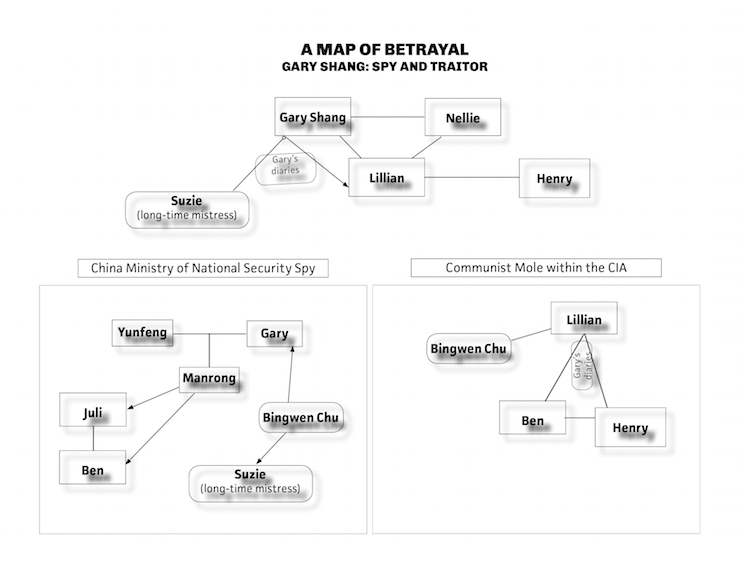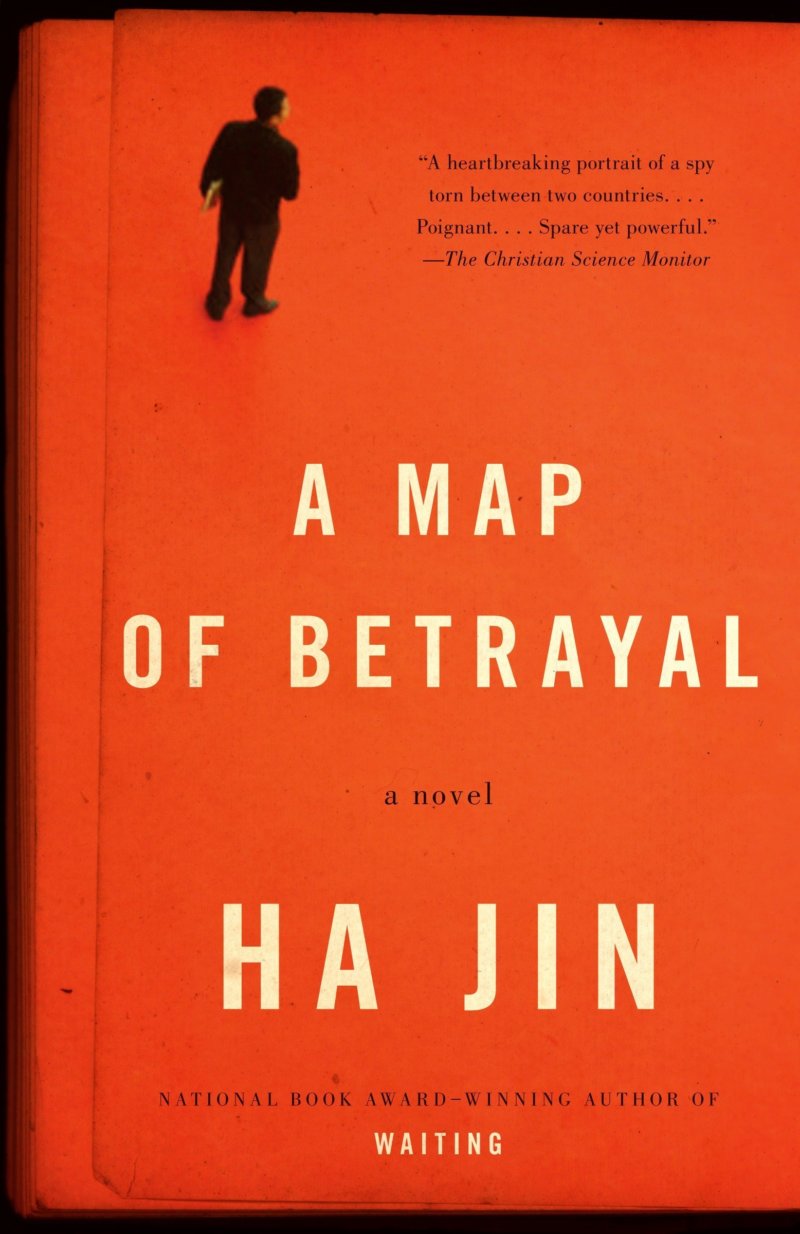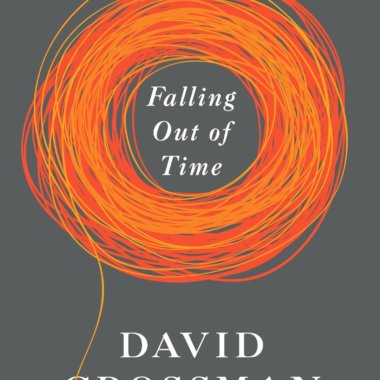Throughout his thirty years as a CIA agent spying for the People’s Republic of China, Gary Weimin Shang, the protagonist in Ha Jin’s psychological novel A Map of Betrayal, betrays not only his adopted country, the United States; his Chinese wife Yufeng; his American wife Nellie; and his Chinese-American mistress Suzie, he also betrays, most of all, himself. He leads a duplicitous life that impacts his two wives and mistress, his daughter Lilian, his colleagues at the CIA, and the national security of the United States.
Lilian, fifty-three years old when the story opens in 2011, is as much a main character as her father Gary. She is an historian about to travel to Beijing to teach at the Beijing Teachers College on a Fulbright scholarship. In 2010, after her mother Nellie dies, Lilian calls Gary’s long-time mistress, Suzie Chao, in Montreal, to whom he has given six morocco-bound volumes of a diary he writes between the years 1949 and 1980. Suzie sends Lilian the volumes, which she studies for insights into her father’s secret life (and reads, as well, all the articles written about him in the New York Times and The Washington Post). She tries to piece together a coherent story, but there are too many fragmented sentences and gaps she cannot explain. Shortly before she embarks on her trip to Beijing, she visits Suzie to ask about the mystery of her father’s first wife Yufeng Liu, whom he marries in his twenties and never sees again after he becomes a spy for China’s Ministry of National Security. Suzie doesn’t know much about Yufeng, but she gives Lilian the old office address of Bingwen Chu, Gary’s Chinese handler, whom she visits when she arrives in Beijing. Although Yufeng has died, Bingwen leads Lilian to her Chinese family, her half-sister Manrong and Manrong’s children and grandchildren.
Lilian is one of the two narrative voices that tell the story of Gary Shang. The other is an omniscient narrator who, it seems, has read Gary’s diary and knows every detail about his spying, from his first interview with the American George Thomas at the American Cultural Agency in Shanghai in 1949 at the end of the Chinese Civil War, to 1980, when he is sentenced to one hundred twenty-one years for funneling national security secrets to the Chinese government. In alternate chapters, Lilian tells her story in the recent past; the omniscient narrator tells the story in chapters beginning in 1949, through the ‘50s, ‘60s, 70s and up to 1980, when the FBI discovers Gary’s treachery.
The two narrative stories are distinctively different, but they are inextricably bound through Lilian’s Chinese grandnephew Ben, who owns a small software company outside of Boston and sends embargoed Intel microchips to China. Although he is a petty spy and Gary a strategic agent—a brilliant long-time mole—Lilian fears that Ben is following in his grandfather’s footsteps. She warns him that her father “didn’t examine his life carefully and lived blind as a result”—an ignorant mistake “of the nefarious nature of the power that used and manipulated him” and dictated how he lived his life. She advises Ben that a country is not innocent, or always right, and asks him, “Hasn’t China used both you and your grandfather relentlessly? Hasn’t your country betrayed you?”
Lilian is determined to save Ben from her father’s tormented, bifurcated life. As the omniscient narrator writes, Gary wants to be a man of the world, to travel between the United States and China and work towards reconciliation between the two countries. In his testimony at his trial, he denies all the charges against him: “‘The two countries are like parents to me…. They are like father and mother, so as a son I cannot separate the two and I love them both…. As a matter of fact, I seized every opportunity to improve the mutual understanding and cooperation between the two countries.’” In the end, he is convicted of spying for China, given a life sentence, and commits suicide not long after he is incarcerated. He is also spurned by the Chinese ambassador to the United States, who denies he ever knew a man named Gary Chang: “‘Let me reiterate. I never heard of that man. China has no spy in the United States at all, so we have nothing to do with him.”
The title A Map of Betrayal signals a pathway into the novel in two ways: First, as a literal “map” that shows the relationships among the characters and how Gary ensnares them in a drama not of their own making; and, second, as a metaphorical “map” that illuminates how his bifurcated life betrays him in his personal life and on the national/international stage. He lives a life whose end can never justify the means.
First, the literal “map” below shows how the characters are connected to Gary, and through this connection, enmeshed in his secret life.

In Boston, Ben conducts petty spying for the Communist government and enlists Lilian’s husband Henry to buy illegal microchips to send to China. As the grandson of a master spy and he himself a spy, Ben binds the two distinct narrative stories—Lilian’s and Gary’s. Lilian takes Ben under her wing, determined he will not end up a tortured man like her father, and she convinces him that spying is not a life at all. She promises Ben that she will give him his grandfather’s six-volume diary when she is finished studying them.
Bingwen Chu is Gary’s handler off and on for thirty years. He interviews Gary in 1949 and is impressed with Gary’s intelligence and fluency in English. Bingwen meets Gary in Hong Kong at least once a year, where Gary delivers the latest intelligence and analysis he has collected. Bingwen tells Gary he is China’s “hero on the invisible front.” Bingwen deposits Gary’s “reward money” in the Hang Seng Bank. He assures Gary that the Chinese government is taking care of Yufeng and his family. Bingwen is also connected to Suzie, who helps her slip into China on a mission to plead with the Chinese leader Deng Xiaoping to swap some imprisoned United States’ spies for Gary’s freedom. Although she is unsuccessful and is told to “‘let that selfish man rot in an American prison together with his silly dream of being loyal to both countries,’” thirty years later she gives Bingwen’s contact information to Lilian, and through him, Lilian finds her Chinese family.
As Gary’s long-time mistress, Suzie is an essential character in the drama that unfolds during Gary’s three decades of spying. He first meets her in 1961, five years after he marries Nellie McCarrick. Tormented by his dislocated and isolated life, he confesses to Suzie about his double life and gives her his diaries. When as a young woman Lilian sees her father in the car with Suzie, she understands that he is “with” another woman. Nellie finds out about the affair through a neighbor who has seen them in bars and restaurants together. Nellie forbids Lilian to contact Suzie until after she dies.
Nellie McCarrick is Gary’s American wife and Lilian’s Irish mother. Lilian describes Gary as a feckless husband that does not love Nellie, although in later years he shows affection toward her. Nellie plays a central role in Gary’s downfall. She wants to buy a bakery for $105,000 from her friend Peggy, with whom she has been working for twenty years. Gary decides he will give her the money so she can support herself when he retires to China. He asks Bingwen for seventy thousand dollars to add to the forty-five thousand dollars deposited in his Hong Kong bank account. Bingwen deposits the requested money, and Gary transfers small amounts every three or four days into his Citibank account. Although he knows he risks his cover, Gary is not aware that the FBI has launched an investigation and placed him under strict surveillance. In September 1980, the agents arrive at Gary’s home. He tells them he will divulge everything as long as his family and his girlfriend are left out of the investigation. After seven hours of interrogation, he is led out of his house in handcuffs and jailed in Arlington, Virginia.
Ben offers an honest assessment of Gary’s fall after reading his grandfather’s diaries. He tells Lilian: “‘His case was a textbook example of stupidity and misjudgment. In a way, you can say it was his love for your mother that did him in…. He got the money for her fucking bakery! That was like blowing his identity on purpose—no professional spy would make such a dangerous move. How could he have got that lax?” Ben points to a motive Gary seems to be unwilling to accept consciously: He is a lonely, tired man.
The second way the title A Map of Betrayal signals a pathway into the novel is through a metaphorical “map” that illuminates the bifurcated life Gary leads. Such an analysis shows how his double life causes him deep, psychological suffering and, thus, can elucidate his inner life.
Gary Shang builds both his personal and professional life around his spying, but his spying catches up with him, as he experiences an emotional deterioration that in the end kills him. Is the espionage, then, worth what Gary sacrifices in order to do is job? This is one of the questions that the omniscient narrator of Gary’s diary implicitly poses. Given the high number of times the narrator comments on Gary’s emotional state, it seems reasonable to conclude that the narrator views Gary’s state of mind as highly significant. Thus, the narrator probes Gary’s diary to reveal the internal contradictions that ultimately betray him.
On the small, personal stage, Gary lives out his life in a quiet suburban neighborhood in Alexandria, Virginia, married to a woman he does not love; loves his daughter but sends her off to boarding school so he can concentrate on his spy craft; and commits to a long-time relationship with his mistress. All along, he is tormented by the guilt that comes with having abandoned his young bride in China without so much as saying goodbye, not knowing until many years later that he is the father of twins. He is wracked by homesickness for his native land, wishing “he could again lie in the steaming pool and then repose on a long bed, free from any care.” His reveries take him far from his American life, as his longing grows “stronger and more tempestuous day by day.”
The toll it takes on Gary’s emotional state can be illustrated in the crazy nature of being a spy and traitor. In 1972, George Thomas, Gary’s boss, presides over a ceremony at which three CIA agents receive a medal for distinguished service. Gary, one of the three agents, is being “recognized for his invaluable analyses and acumen, which had helped the United States find ways to engage China.” Thomas adds a personal note after he reads the citation: “‘Gary Shang is a longtime colleague of ours and doesn’t need an introduction. You all know he’s one of the most accomplished translators and an expert in our profession…. He’s a model of devotion, diligence, and loyalty. I count him not only as an outstanding colleague but also as a dear friend.’”
Only two months prior to Gary’s receiving the medal at the CIA headquarters, he is feted at a sumptuous banquet in his honor. At a Hong Kong restaurant attended by his superiors, Gary is praised for his “invaluable intelligence [that] had enabled China to handle international politics and diplomacy with prescience and assuredness,” a reference to Mao’s remark that he is “‘worth four armored divisions.’” He is promoted to vice minister of national security and awarded twenty thousand dollars. Gary thanks his superiors for their beneficence and tells them he performs his duty out of his deep love for his motherland. His sacrifice is worth it if the intelligence he gathers makes his country safer. Later, Gary tells Bingwen that the promotion doesn’t mean much in the United States because he is just a lowly CIA translator. Bingwen counters, “‘But you are our hero!.. Your feats will go down in our Party’s intelligence history. You’re a dagger plunged in the enemy’s heart.’” Gary’s reaction to Bingwen’s superlatives reveals the internal contradictions at the heart of Gary’s psychological suffering that ultimately destroys him: “Gary was a heartbeat away from saying he’d trade any heroic name for a normal life, but he closed his eyes as if he were about to drift off to sleep. He stifled the urge to cry.”
That Gary flies under the radar of the FBI for thirty years indicates a special kind of competence, whether it involves brilliance, diligence, or perseverance. Gary has all three, but Lilian understands something about her father that rings truer: She sees a tragic figure whose flaws supersede those attributes. He is afraid to be alone. He plants one foot in China, the other in America, and does not feel that he belongs to either one. If only he were an immigrant who could savor his success, he thinks. Whatever he understands about his circumstances, it does not reach the level of consciousness whereby he can (or will) take action to escape his confinement in the narrow world of spying.
Gary Shang may seem to be a dull spy in A Map of Betrayal, certainly not one who stimulates the adrenaline. But looking deeper, Ha Jin doesn’t seem interested in writing a “thriller.” Rather, his spy is a man who cannot resolve the internal contradictions that betray him, his family in China, his family in America, and the country that he grows to love. He fits the bill for a novel called A Map of Betrayal.



